Goslings (8)
By:
October 26, 2012
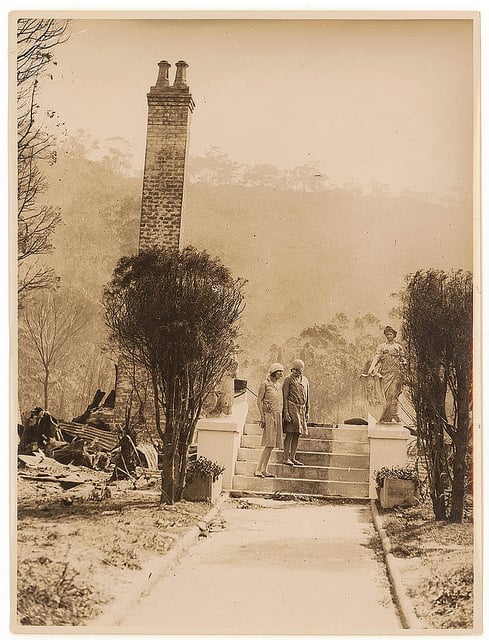
HILOBROW is pleased to present the eighth installment of our serialization of J.D. Beresford’s Goslings (also known as A World of Women). New installments will appear each Friday for 23 weeks.
When a plague kills off most of England’s male population, the proper bourgeois Mr. Gosling abandons his family for a life of lechery. His daughters — who have never been permitted to learn self-reliance — in turn escape London for the countryside, where they find meaningful roles in a female-dominated agricultural commune. That is, until the Goslings’ idyll is threatened by their elders’ prejudices about free love!
J.D. Beresford’s friend the poet and novelist Walter de la Mare consulted on Goslings, which was first published in 1913. In May 2013, HiLoBooks will publish a beautiful new edition of the book. “A fantastic commentary upon life,” wrote W.L. George in The Bookman (1914). “Mr. Beresford possesses the rare gift of divination,” wrote The Living Age (1916). “It is piece of the most vivid imaginative realism, as well as a challenge to our vaunted civilization.” “At once a postapocalyptic adventure, a comedy of manners, and a tract on sexual and social equality, Goslings is by turns funny, horrifying, and politically stirring,” says Benjamin Kunkel in a blurb for HiLoBooks. “Most remarkable of all may be that it has not yet been recognized as a classic.”
SUBSCRIBE to HILOBROW’s serialized fiction via RSS.
ALL EXCERPTS: 1 | 2 | 3 | 4 | 5 | 6 | 7 | 8 | 9 | 10 | 11 | 12 | 13 | 14 | 15 | 16 | 17 | 18 | 19 | 20 | 21 | 22 | 23
IX
THE DEVOLUTION OF GEORGE GOSLING
The progress of the plague through London and the world in general was marked, in the earlier stages, by much the same developments as are reported of the plague of 1665. The closed houses, the burial pits, the deserted streets, the outbreaks of every kind of excess, the various symptoms of fear, cowardice, fortitude and courage, evidenced little change in the average of humanity between the seventeenth and the twentieth centuries. The most notable difference during these earlier stages was in the enormously increased rapidity with which the population of London was reduced to starvation point. Even before the plague had reached England, want had become general, so general, indeed, as to have demonstrated very clearly the truth of the great economist’s contention that England could not exist for three months with closed doors.
The coming of the plague threw London on to its own very limited resources. That vast city, which produced nothing but the tokens of wealth, and added nothing to the essentials that support life, was instantly reduced to the state of Paris in the winter of 1870–71; with the difference, however, that London’s population could be decreased rapidly by emigration, and was, also, even more rapidly decreased by pestilence. Yet there was a large section of the population which clung with blind obstinacy to the only life it knew how to live.
There was, for instance, George Gosling, more fortunate in many respects than the average citizen, who clung desperately to his house in Wisteria Grove until forced out of it by the lack of water.
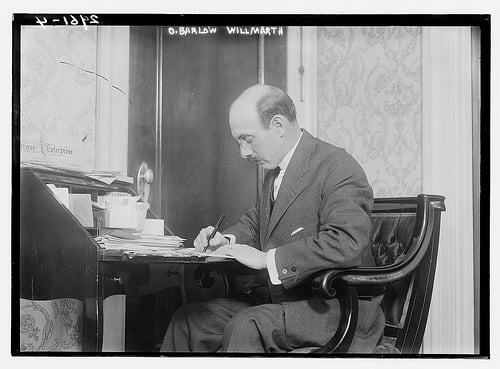
On the ninth day after the first coming of the plague to London — it appeared simultaneously in a dozen places and spread with fearful rapidity — Gosling broke one of the great laws he had hitherto observed with such admirable prudence. The offices and warehouse in Barbican had been shut up (temporarily, it was supposed), and the partners had disappeared from London. But Gosling had a duplicate set of keys, and, inspired by the urgency of his family’s need, he determined to dare a journey into the City in order to borrow (he laid great stress on the word) a few necessaries of life from the well-stored warehouse of his firm.
In this scheme, planned with some shrewdness, he co-operated with a friend, a fellow-sidesman at the Church of St John the Evangelist. This friend was a coal merchant, and thus fortunately circumstanced in the possession of wagons and horses.
These two arranged the details of their borrowing expedition between them. Economically, it was a deal on the lines of the revived methods of exchange and barter. Gosling was willing to exchange certain advantages of knowledge and possession for the hire of wagons and horses. It was decided, for obvious reasons, to admit no other conspirator into the plot, and Boost, the coal merchant, drove one cart and Gosling drove the other. Perhaps it should rather be said that he led the other, for, after a preliminary trial, he decided that he was safer at the horses’ heads than behind their tails.
The raid was conducted with perfect success. Boost had a head for essentials. The invaluable loads of tinned meats, fruits and vegetables were screened by tarpaulins from the possibly too envious eyes of hungry passers-by — quite a number of vagrants were to be seen in the streets on that day — and Boost and Gosling, disguised in coal-begrimed garments, made the return journey lugubriously calling, “Plague, plague,” the cry of the drivers of the funeral carts which had even then become necessary. Their only checks were the various applications they received for the cartage of corpses; applications easily put on one side by pointing to the piled-up carts — they had spent six laborious hours in packing them. “No room; no room,” they cried, and on that day the applicants who accosted Boost and Gosling were not the only ones who had to wait for the disposal of their dead.
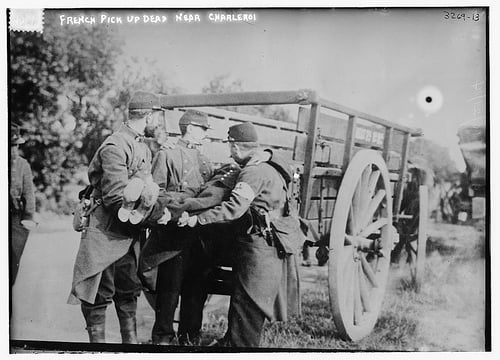
Gosling arrived at Wisteria Grove, hot and outwardly jubilant, albeit with a horrible fear lurking in his mind that he had been in dangerous proximity to those tendered additions to his load. His booty was stored in one of the downstairs rooms with the assistance of Mrs Gosling and the two girls; they managed the unpacking without interruption in two hours and a half and then, with boarded windows and locked doors, the Goslings sat down to await the passing of horror.
Boost died of the plague forty-eight hours after the great adventure, but as he had a wife and four daughters his plunder was not wasted.
2
For nearly a fortnight after the raid the Goslings lay snug in their little house in Wisteria Grove, for they, in company with the majority of English people at this time, had not yet fully appreciated the fact that women were almost immune from infection. In all, not more than eight per cent of the whole female population was attacked, and of this proportion the mortality was almost exclusively among women over fifty years of age. When the first faint rumours of the plague had come to Europe, this curious, almost unprecedented, immunity of women had been given considerable prominence. It had made good copy, theories on the subject had appeared, and the point had aroused more interest than that of the mortality among males — infectious diseases were commonplace enough; this new phase had a certain novelty and piquancy. But the threat of European infection had overwhelmed the interest in the odd predilection of the unknown bacterium, and the more vital question had thrown this peculiarity into the background. Thus the Goslings and most other women feared attack no less than their husbands, brothers and sons, and found justification for their fears in the undoubted fact that women had died of the plague.
The Goslings had always jogged along amiably enough; their home life would have passed muster as a tolerably happy one. The head of the family was out of the house from 8.15 a.m. to 7.15 p.m. five days of the week, and it was only occasionally in the evening of some long wet Sunday that there was any open bickering.
Now, confinement in that little house, aggravated by fear and by the absence of any interest or diversion coming from outside, showed the family to one another in new aspects. Before two days had passed the air was tense with the suppressed irritation of these four people, held together by scarcely any tie other than that of a conventional affection.
By the third day the air was so heavily charged that some explosion was inevitable. It came early in the morning.
Gosling had run out of tobacco, and he thought in the circumstances that it would be wiser to send Blanche or Millie than to go himself. So, with an air of exaggerated carelessness, he said:
“Look here, Millie, my gel, I wish you’d just run out and see if you can get me any terbaccer.”
“Not me,” replied Millie, with decision.
“And why not?’ asked Gosling.
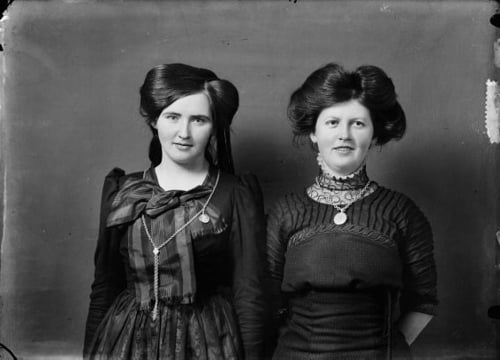
Millie shrugged her shoulders, and called her sister, who was in the passage. “I say, B., father wants us to go out shopping for him. Are you on?”
Blanche, duster in hand, appeared at the doorway.
“Why doesn’t he go himself?” she asked.
“Because,” replied her father, getting very red, and speaking with elaborate care, “men’s subject to the infection and women is not.”
“That’s all my eye,” returned Millie. “Lots of women have got it.”
“It’s well known,” said Gosling, still keeping himself in hand, “a matter of common knowledge, that women is comparatively immune.”
“Oh, that’s a man’s yarn, that is,” said Blanche, “just to save themselves. We all know what men are — selfish brutes!”
“Are you going to fetch me that terbaccer or are you not?” shouted Mr Gosling suddenly.
“No, we aren’t,” said Millie, defiantly. “It isn’t safe for girls to go about the streets, let alone the risk of infection.” She had heard her father shout before, and she was not, as yet, at all intimidated.
“Well, then, I say you are!” shouted her father. “Lazy, good-for-nothing creatures, the pair of you! ’Oose paid for everything you’ve eat or drunk or wore ever since you was born? An’ now you won’t even go an errand.” Then, seeing the ready retort rising to his daughters’ lips, he grew desperate, and, advancing a step towards them, he said savagely: “If you don’t go, I’ll find a way to make yer!”
This was a new aspect, and the two girls were a little frightened. Natural instinct prompted them to scream for their mother.
She had been listening at the top of the stairs, and she answered the call for help with great promptitude.
“You ought to be ashamed of yourself, Gosling,” she said, on a high note. “The streets isn’t safe for gels, as you know well enough; and why should my gels risk their lives for the sake of your nasty, dirty, wasteful ’abit of smoking, I should like to know?”
Gosling’s new-found courage was evaporating at the attack of this third enemy. He had been incensed against his daughters, but he had not yet overcome the habit of giving in to his wife, for the sake of peace. She had managed him very capably for a quarter of a century, but on the occasions when she had found it necessary to use what she called the “rough side of her tongue” she had demonstrated very clearly which of the two was master.
“I should have thought I might ’a been allowed a little terbaccer,” he said, resentfully. “’Oo risked his life to lay in provisions, I should like to know? An’ it’s a matter o’ common knowledge as women is immune from this plague.”
“And Mrs Carter, three doors off, carried out dead of it the day before yesterday!” remarked Mrs Gosling, triumphantly.
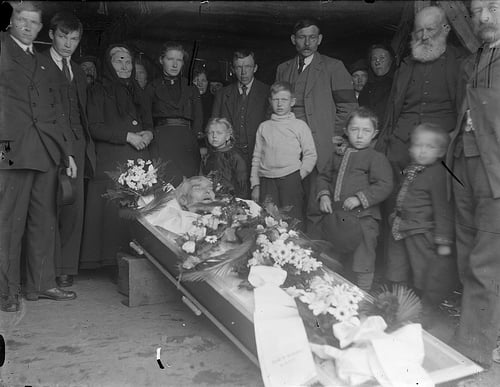
“Oh, ’ere and there, a case or two,” replied her husband. “But not one woman to a thousand men gets it, as every one knows.”
“And how do you know I mightn’t be the one?” asked Millie, bold now under her mother’s protection.
For that morning, the matter remained in abeyance; but Gosling, muttering and grumbling, nursed his injury and meditated on the fact that his daughters had been afraid of him. Things were altered now. There was no convention to tie his hands. He would work himself into a protective passion and defy the three of them. Also, there was an unopened bottle of whisky in the sideboard.
Nevertheless, he would have put off the trial of his strength if he had had to seek an opportunity. He was, as yet, too civilized to take the initiative in cold blood.
The opportunity, however, soon presented itself in that house. The air had been little cleared by the morning’s outbreak, and before evening the real explosion came. A mere trifle originated it a warning from Gosling that their store of provisions would not last for ever, and a sharp retort from Millie to the effect that her father did not stint himself, followed by a reminder from Mrs Gosling that the raid might be repeated.
“Oh! yes, you’d be willing enough for me to die of the plague, I’ve no doubt!” broke out Gosling. “I can walk six mile to get you pervisions, but you can’t go to the corner of the street for my terbaccer.”
“Pervisions is necessary, terbaccer ain’t,” said Mrs Gosling. She was not a clever woman. She judged this to be the right opportunity to keep her husband in his place, and relied implicitly on the quelling power of her tongue. Her intuitions were those of the woman who had lived all her life in a London suburb; they did not warn her that she was now dealing with a specimen of half-decivilized humanity.
“Oh! ain’t it?” shouted Gosling, getting to his feet. His face was purple, and his pale blue eyes were starting from his head. “I’ll soon show you what’s necessary and what ain’t, and ’oose master in this ’ouse. And I say terbaccer is necessary, an’ what’s more, one o’ you three’s goin’ to fetch it quick! D’ye ’ear — one — o’— you — three!”
This inclusion of Mrs Gosling was, indeed, to declare war.
Millie and Blanche screamed and backed, but their mother rose to the occasion. She did not reserve herself; she began on her top note; but Gosling did not allow her to finish. He strode over to her and shook her by the shoulders, shouting to drown her strident recriminations. “’Old your tongue! ’old your tongue!” he bawled, and shook her with increasing violence. He was feeling his power, and when his wife crumpled up and fell to the floor in shrieking hysterics, he still strode on to victory. Taking the cowed and terrified Millie by the arm, he dragged her along the passage, unlocked and opened the front door and pushed her out into the street. “And don’t you come back without my terbaccer!” he shouted.
“How much?” quavered the shrinking Millie.
“’Alf-a-crown’s worth,” replied Gosling fiercely, and tossed the coin down on the little tiled walk that led up to the front door.
After Millie had gone he stood at the door for a moment, thankful for the coolness of the air on his heated face. “I got to keep this up,” he murmured to himself, with his first thought of wavering. Behind him he heard the sound of uncontrolled weeping and little cries of the “first time in twenty-four years” and “what the neighbours’ll think, I don’t know.”
“Neighbours,” muttered Gosling, contemptuously, “there aren’t any neighbours — not to count.”
A distant sound of slow wheels caught his ear. He listened attentively, and there came to him the remote monotonous chant of a dull voice crying: “Plague! Plague!”
He stepped in quickly and closed the door.
3
Millie found the Kilburn High Road deserted. No traffic of any kind was to be seen in the street, and the rare foot-passengers, chiefly women, had all a furtive air. Starvation had driven them out to raid. No easy matter, as Millie soon found, for all shutters were down, and in many cases shop-fronts were additionally protected by great sheets of strong hoarding.
Millie, recovering from her fright, was growing resentful. Her little conventional mind was greatly occupied by the fact that she was out in the High Road wearing house-shoes without heels, in an old print dress, and with no hat to hide the carelessness of her hair-dressing. At the corner of Wisteria Grove she stopped and tried to remedy this last defect; she had red hair, abundant and difficult to control.
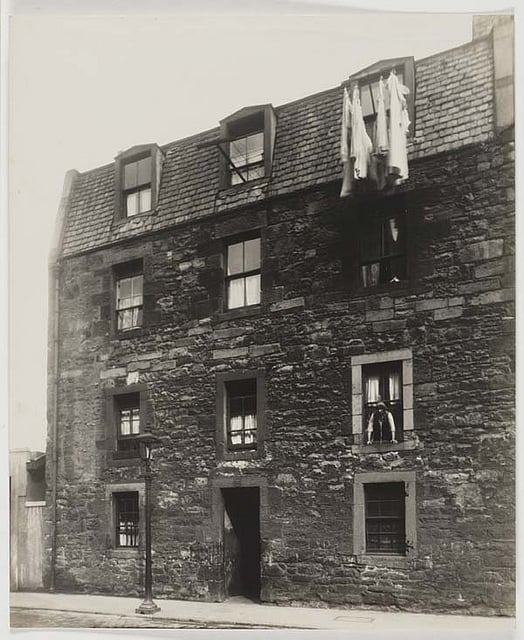
The sight of the deserted High Road did not inspire her with self-confidence; she still feared the possibility of meeting some one who might recognize her. How could one account for one’s presence in a London thoroughfare at seven o’clock on a bright May evening in such attire? Certainly not by telling the truth.
The air was wonderfully clear. Coal was becoming very scarce, and few fires had been lighted that day to belch forth their burden of greasy filth into the atmosphere. The sun was sinking, and Millie instinctively clung to the shadow of the pavement on the west side of the road. She, too, slunk along with the evasive air that was common to the few other pedestrians, the majority of them on this same shadowed pavement. That warm, radiant light on the houses opposite seemed to hold some horror for them.
So preoccupied was Millie with her resentment that she wandered for two or three hundred yards up the road without any distinct idea of what she was seeking. When realization of the futility of her search came to her, she stopped in the shadow of a doorway. “What is the good of going on?’ she argued. “All the shops are shut up.” But the thought of her father in his new aspect of muscular tyrant intimidated her. She dared not return without accomplishing her errand. “I’ll have another look, anyway,” she said; and then: “Who’d have thought he was such a brute?” She rubbed the bruise on her arm; her mouth was twisted into an ugly expression of spiteful resentment. Her thoughts were busy with plans of revenge even as she turned to prosecute her search for the tyrant’s tobacco.
Here and there shops had been forcibly, burglariously entered, plate-glass windows smashed, and interiors cleared of everything eatable; the debris showed plainly enough that these rifled shops had all belonged to grocers or provision merchants. Into each of these ruins Millie stared curiously, hoping foolishly that she might find what she sought. She ventured into one and carried away a box of soap — they were running short of soap at home. A sense of moving among accessible riches stirred within her, a desire for further pillage.
She came at last to a shop where the shutters were still intact, but the door hung drunkenly on one hinge. A little fearfully she peered in and discovered that fortune had been kind to her. The shop had belonged to a tobacconist, and the contents were almost untouched — there had been more crying needs to satisfy in the households of raiders than the desire for tobacco.
It was very dark inside, and for some seconds Millie stared into what seemed absolute blackness, but as her eyes became accustomed to the gloom, she saw the interior begin to take outline, and when she moved a couple of steps into the place and allowed more light to come in through the doorway, various tins, boxes and packets in the shelves behind the counter were faintly distinguishable.
Once inside, the spirit of plunder took hold of her, and she began to take down boxes of cigars and cigarettes and packets of tobacco, piling them up in a heap on the counter. But she had no basket in which to carry the accumulation she was making, and she was feeling under the counter for some box into which to put her haul, when the shadows round her deepened again into almost absolute darkness. Cautiously she peered up over the counter and saw the silhouette of a woman standing in the doorway.
For ten breathless seconds Millie hung motionless, her eyes fixed on the apparition. She was very civilized still, and she was suddenly conscious of committing a crime. She feared horribly lest the figure in the doorway might discover Millicent Gosling stealing tobacco. But the intruder, after recognizing the nature of the shop’s contents, moved away with a sigh. Millie heard her dragging footsteps shuffle past the window.
That scare decided her movements. She hastily looped up the front of her skirt, bundled into it as much plunder as she could conveniently carry, and made her way out into the street again.
She was nearly at the corner of Wisteria Grove before she was molested, and then an elderly woman came suddenly out of a doorway and laid a hand on Millie’s arm.
“Whacher got?” asked the woman savagely.
Millie, shrinking and terrified, displayed her plunder.
“Cigars,” muttered the woman. “Whacher want with cigars?” She opened the boxes and stirred up the contents of Millie’s improvised bundle in an eager search for something to eat. “Gawd’s truth! yer must be crazy, yer thievin’ little slut!” she grumbled, and pushed the girl fiercely from her.
Millie made good her escape, dropping a box of cigars in her flight. Her one thought now was the fear of meeting a policeman. In three minutes she was beating fiercely on the door of the little house in Wisteria Grove, and, disregarding her father’s exclamations of pleased surprise when he let her in, she tumbled in a heap on to the mat in the passage.
Gosling’s first declaration of male superiority had been splendidly successful.
4
A few minutes after Millie’s return, Mrs Gosling, red-eyed and timidly vicious, interrupted her husband’s perfect enjoyment of the long-desired cigar by the announcement: “The gas is off!”
Gosling got up, struck a match, and held it to the sitting-room burner. The match burned steadily. There was no pressure even of air in the pipes.
“Turned off at the meter!” snapped Gosling. “’Ere, lemme go an’ see!” He spoke with the air of the superior male, strong in his comprehension of the mechanical artifices which so perplex the feminine mind. Mrs Gosling sniffed, and stood aside to let him pass. She had already examined the meter.
“Well, we got lamps!” snarled Gosling when he returned. He had always preferred a lamp to read by in the evening.
“No oil,” returned Mrs Gosling, gloomily. She’d teach him to shake her!
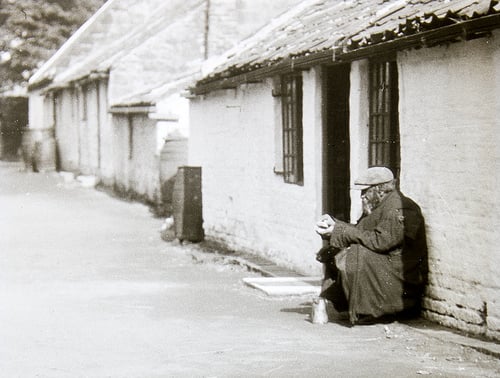
Gosling meditated. His parochial mind was full of indignation. Vague thoughts of “getting some one into trouble for this”— even of that last, desperate act of coercion, writing to the papers about it — flitted through his mind. Plainly something must be done. “’Aven’t you got any candles?” he asked.
“One or two. They won’t last long,” replied his studiously patient partner.
“Well, we’ll ’ave to use them to-night and go to bed early,” was Gosling’s final judgment. His wife left the room with a shrug of forbearing contempt.
When she had gone, the head of the house went upstairs and peered out into the street. The sun had set, and an unprecedented mystery of darkness was falling over London. The globes of the tall electric standards, catching a last reflection from the fading sky, glimmered faintly, but were not illuminated from within by any fierce glare of violet light. Darkness and silence enfolded the great dim organism that sprawled its vast being over the earth. The spirit of mystery caught Gosling in its spell. “All dark,” he murmured, “and quiet! Lord! how still it is!” Even in his own house there was silence. Downstairs, three injured, resentful women were talking in whispers.
Gosling, still sucking his cigar, stood entranced, peering into the darkness; he had ventured so far as to throw up the sash. “It’s the stillness of death!” he muttered. Then he cocked his head on one side, for he caught the sound of distant shouting. Somewhere in the Kilburn Road another raid was in progress.
“No light,” murmured Gosling, “and no fire!”
An immediate association suggested itself. “By gosh! and no water!” he added. For some seconds he contemplated with fearful awe the failure of the great essential of life. In the cistern room he was reassured by the sound of a delicious trickle from the ball-cock. “Still going,” he said to himself; “but we’ll ’ave to be careful. Surely they’ll keep the water goin’, though; whatever ’appens, they’d surely keep the water on?”
RADIUM AGE SCIENCE FICTION: “Radium Age” is HILOBROW’s name for the 1904–33 era, which saw the discovery of radioactivity, the revelation that matter itself is constantly in movement — a fitting metaphor for the first decades of the 20th century, during which old scientific, religious, political, and social certainties were shattered. This era also saw the publication of genre-shattering writing by Edgar Rice Burroughs, Sax Rohmer, E.E. “Doc” Smith, Jack London, Arthur Conan Doyle, Aldous Huxley, Olaf Stapledon, Karel Čapek, H.P. Lovecraft, Charlotte Perkins Gilman, Yevgeny Zamyatin, Philip Gordon Wylie, and other pioneers of post-Verne/Wells, pre-Golden Age “science fiction.” More info here.
HILOBOOKS: The mission of HiLoBooks is to serialize novels on HiLobrow; and also, as of 2012, operating as an imprint of Richard Nash’s Cursor, to reissue Radium Age science fiction in beautiful new print editions. So far, we have published Jack London’s The Scarlet Plague, Rudyard Kipling’s With the Night Mail (and “As Easy as A.B.C.”), Arthur Conan Doyle’s The Poison Belt, H. Rider Haggard’s When the World Shook, Edward Shanks’s The People of the Ruins, William Hope Hodgson’s The Night Land, and J.D. Beresford’s Goslings. Forthcoming: E.V. Odle’s The Clockwork Man, Cicely Hamilton’s Theodore Savage, and Muriel Jaeger’s The Man with Six Senses. For more information, visit the HiLoBooks homepage.
SERIALIZED BY HILOBOOKS: Jack London’s The Scarlet Plague | Rudyard Kipling’s With the Night Mail (and “As Easy as A.B.C.”) | Arthur Conan Doyle’s The Poison Belt | H. Rider Haggard’s When the World Shook | Edward Shanks’ The People of the Ruins | William Hope Hodgson’s The Night Land | J.D. Beresford’s Goslings | E.V. Odle’s The Clockwork Man | Cicely Hamilton’s Theodore Savage | Muriel Jaeger’s The Man With Six Senses | Jack London’s “The Red One” | Philip Francis Nowlan’s Armageddon 2419 A.D. | Homer Eon Flint’s The Devolutionist | W.E.B. DuBois’s “The Comet” | Edgar Rice Burroughs’s The Moon Men | Charlotte Perkins Gilman’s Herland | Sax Rohmer’s “The Zayat Kiss” | Eimar O’Duffy’s King Goshawk and the Birds | Frances Hodgson Burnett’s The Lost Prince | Morley Roberts’s The Fugitives | Helen MacInnes’s The Unconquerable | Geoffrey Household’s Watcher in the Shadows | William Haggard’s The High Wire | Hammond Innes’s Air Bridge | James Branch Cabell’s Jurgen | John Buchan’s “No Man’s Land” | John Russell’s “The Fourth Man” | E.M. Forster’s “The Machine Stops” | John Buchan’s Huntingtower | Arthur Conan Doyle’s When the World Screamed | Victor Bridges’ A Rogue By Compulsion | Jack London’s The Iron Heel | H. De Vere Stacpoole’s The Man Who Lost Himself | P.G. Wodehouse’s Leave It to Psmith | Richard Connell’s “The Most Dangerous Game” | Houdini and Lovecraft’s “Imprisoned with the Pharaohs” | Arthur Conan Doyle’s “The Sussex Vampire.”
ORIGINAL FICTION: HILOBROW has serialized three novels: James Parker’s The Ballad of Cocky The Fox (“a proof-of-concept that serialization can work on the Internet” — The Atlantic); Karinne Keithley Syers’s Linda Linda Linda (which includes original music); and Robert Waldron’s roman à clef The School on the Fens. We also publish original stories and comics. These include: Matthew Battles’s stories “Gita Nova“, “Makes the Man,” “Imago,” “Camera Lucida,” “A Simple Message”, “Children of the Volcano”, “The Gnomon”, “Billable Memories”, “For Provisional Description of Superficial Features”, “The Dogs in the Trees”, “The Sovereignties of Invention”, and “Survivor: The Island of Dr. Moreau”; several of these later appeared in the collection The Sovereignties of Invention | Peggy Nelson’s “Mood Indigo“, “Top Kill Fail“, and “Mercerism” | Annalee Newitz’s “The Great Oxygen Race” | Flourish Klink’s Star Trek fanfic “Conference Comms” | Charlie Mitchell’s “A Fantasy Land” | Charlie Mitchell’s “Sentinels” | Joshua Glenn’s “The Lawless One”, and the mashup story “Zarathustra vs. Swamp Thing” | Adam McGovern and Paolo Leandri’s Idoru Jones comics | John Holbo’s “Sugarplum Squeampunk” | “Another Corporate Death” (1) and “Another Corporate Death” (2) by Mike Fleisch | Kathryn Kuitenbrouwer and Frank Fiorentino’s graphic novel “The Song of Otto” (excerpt) | John Holbo’s graphic novel On Beyond Zarathustra (excerpt) | “Manoj” and “Josh” by Vijay Balakrishnan | “Verge” by Chris Rossi, and his audio novel Low Priority Hero | EPIC WINS: THE ILIAD (1.408-415) by Flourish Klink | EPIC WINS: THE KALEVALA (3.1-278) by James Parker | EPIC WINS: THE ARGONAUTICA (2.815-834) by Joshua Glenn | EPIC WINS: THE MYTH OF THE ELK by Matthew Battles | TROUBLED SUPERHUMAN CONTEST: Charles Pappas, “The Law” | CATASTROPHE CONTEST: Timothy Raymond, “Hem and the Flood” | TELEPATHY CONTEST: Rachel Ellis Adams, “Fatima, Can You Hear Me?” | OIL SPILL CONTEST: A.E. Smith, “Sound Thinking | LITTLE NEMO CAPTION CONTEST: Joe Lyons, “Necronomicon” | SPOOKY-KOOKY CONTEST: Tucker Cummings, “Well Marbled” | INVENT-A-HERO CONTEST: TG Gibbon, “The Firefly” | FANFICTION CONTEST: Lyette Mercier’s “Sex and the Single Superhero”
